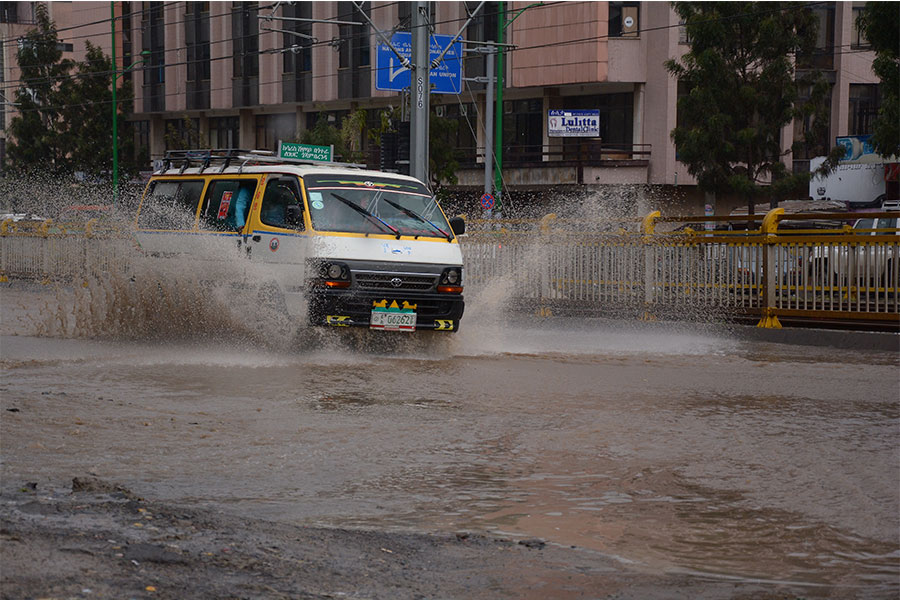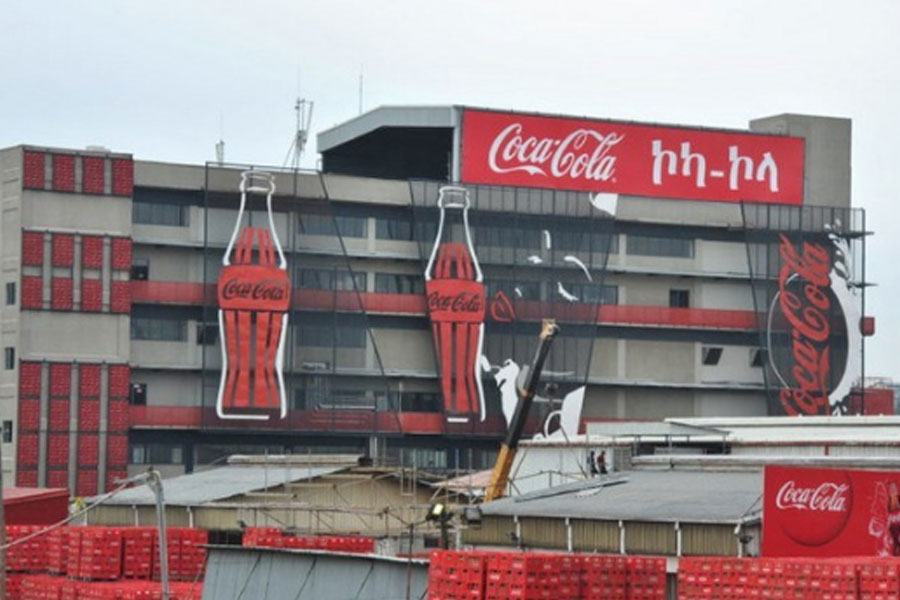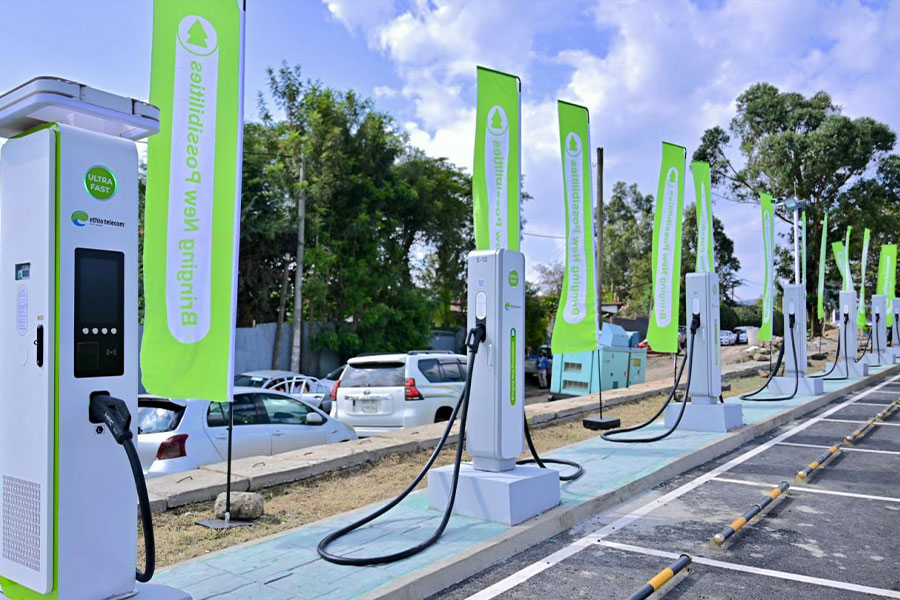
View From Arada | Dec 31,2022
Addis Abeba's streets are a mix of commerce and survival, where vendors and beggars are amidst the chaotic traffic in pursuit of a living.
At every stoplight, the streets transform into an open-air marketplace. Kleenex sellers approach each vehicle, undeterred by the regulations that prohibit their trade. When drivers refuse, they swiftly offer small towels for cleaning the car's interior. Despite repeated rejections, they cling to windows, waiting until the light turns green and the cars move on. Equally determined are the young men selling windshield wipers, pushing their goods with the same relentless energy.
The streets pulse with activity and every transaction is a means of survival. Lottery ticket sellers add to the scene, confidently predicting that buyers will win the jackpot. Their optimism may not influence the outcome, but it keeps hope alive, a necessary ingredient for the sale.
The streets are not only about vendors. Beggars weave through the same crowded roads, seeking alms with persistence that mirrors the vendors'. A driver’s small act of charity usually brings a flood of blessings, but the cycle continues, posing risks to both traffic and pedestrians.
Less visible, but just as present, are the pickpockets who blend seamlessly into the crowds. Their trade thrives in the city's confusion, taking advantage of the chaos to operate unnoticed. The busy streets and crowded buses provide ample opportunities for these thieves to ply their trade, turning the city's constant motion into their gain.
I recall an incident from my high school days when two men boarded the Anbessa bus line number six near the Black Lion Hospital. They positioned themselves around an elderly man, who was burdened with bags in both hands, clinging to the bus poles with his fingers. They jostled him repeatedly, destabilising the old man as the bus swayed, creating the perfect conditions to search his pockets unnoticed.
My friend and I, both in junior high, watched in silence, too afraid to intervene. The situation, though serious, had an absurd twist—despite the thieves’ efforts, the old man remained unaware, and his pockets turned out one by one without him noticing. In the end, the thieves found nothing of value and got off the bus around the Bulgaria Embassy, leaving the old man to regain his balance.
Another facet of street life plays out these days. Bakers, dressed in aprons and chef caps, line the streets, trying to catch the attention of passing drivers. Wearing green reflector vests and white caps, they could easily be mistaken for traffic police. As soon as a car slows down, they approach to make a sale.
The highway near Ayat Square is also lined with fruit sellers, pushing wheelbarrows and using aggressive tactics to hawk their goods. They approach car windows with smiles and a “customer is king” attitude, talking rapidly about their offerings and swearing it is the best deal around. I was once even offered a free banana as an incentive to buy more.
This phenomenon is not unique to the capital. In other rapidly growing urban centres across the globe, similar scenes unfold. In the dense downtowns of many Asian cities, thousands of petty vendors, beggars, and pickpockets compete for space on the streets.
In Thailand, for instance, the National Economic & Social Development Board reports that 71pc of the national labour force operates within the informal sector, contributing to nearly 84pc of the urban economy. Street markets there are regulated to the point where entire roads are closed for vending at night. Street vendors, beggars, and peddlers, alongside outdoor bars, are all integral parts of the city’s vibrant street life.
Motorbikes are another notable feature of Addis Abeba’s streets, zipping through traffic with agility and speed. They play a crucial role in supporting the city’s economy, handling food deliveries and e-commerce parcels. Their ability to manoeuvre through congested streets makes them indispensable for quick deliveries.
I recently experienced this efficiency firsthand when I needed a spare part for my car from another part of town. A quick transfer of money and the part was delivered by a motorbike courier within minutes. Many auto workshops rely on these services, saving time and energy. However, the same speed that makes these motorbikes effective also poses a threat, as they can be easily used for snatch-and-grab robberies.
The outskirts are also home to a farmers' market where fresh vegetables and fruits are sold. These markets, which were once open only on Sundays, now operate daily, providing much-needed affordable produce during times of rising inflation.
While many depend on street activities for their livelihood, the dangers associated with these unregulated activities cannot be ignored. Uncontrolled roadside commerce contributes to increased crime, congestion, and traffic hazards. There is an ongoing struggle between these street actors and the authorities tasked with keeping the roads safe.
The city centres are flooded with people, creating an overwhelming environment. In areas where corridor development projects have been completed, some of these problems have been alleviated. Well-marked roads discourage unregulated activities, suggesting a path toward a healthier urban environment.
However, those making a living on the streets persist. Kleenex and windshield wiper sellers prefer the less visible sides of the road or the middle of traffic, staying out of sight of the authorities. If any group benefits from the gridlock of peak-hour traffic, it is this mobile sales force. The small size of the items they sell also works in their favour as they move through the slow-moving traffic.
These individuals are permanent fixtures in the roadside economy. Managing them is a challenge, but they are an integral part of the urban space. Their determination is evident, and it may be possible to harness the positive aspects of their activities while ensuring safety through proper regulation.
Addressing the issue of street beggars, in particular, requires a deeper look at the underlying socioeconomic issues. Begging is a problem seen worldwide, not just in Addis Abeba. Historically, alms-houses were established in the UK as early as the 11th century to care for the poor and distressed. Today, many such services are provided by NGOs and church organisations. A thoughtful approach to regulating street activities could bring long-term benefits, contributing positively to the well-being of urban society.
PUBLISHED ON
Aug 10,2024 [ VOL
25 , NO
1267]


View From Arada | Dec 31,2022

View From Arada | Apr 26,2019

Editorial | Mar 25,2023

Advertorials | Dec 06,2023

Sunday with Eden | Jul 31,2021

Sunday with Eden | Mar 30,2024


Fortune News | Mar 27,2021

Radar | Dec 15,2024

Fortune News | May 31,2025

Dec 22 , 2024 . By TIZITA SHEWAFERAW
Charged with transforming colossal state-owned enterprises into modern and competitiv...

Aug 18 , 2024 . By AKSAH ITALO
Although predictable Yonas Zerihun's job in the ride-hailing service is not immune to...

Jul 28 , 2024 . By TIZITA SHEWAFERAW
Unhabitual, perhaps too many, Samuel Gebreyohannes, 38, used to occasionally enjoy a couple of beers at breakfast. However, he recently swit...

Jul 13 , 2024 . By AKSAH ITALO
Investors who rely on tractors, trucks, and field vehicles for commuting, transporting commodities, and f...

Oct 18 , 2025
The political establishment, notably the ruling party and its top brass, has become p...

Oct 11 , 2025
Ladislas Farago, a roving Associated Press (AP) correspondent, arrived in Ethiopia in...

Oct 4 , 2025
Eyob Tekalegn (PhD) had been in the Governor's chair for only weeks when, on Septembe...

Sep 27 , 2025
Four years into an experiment with “shock therapy” in education, the national moo...